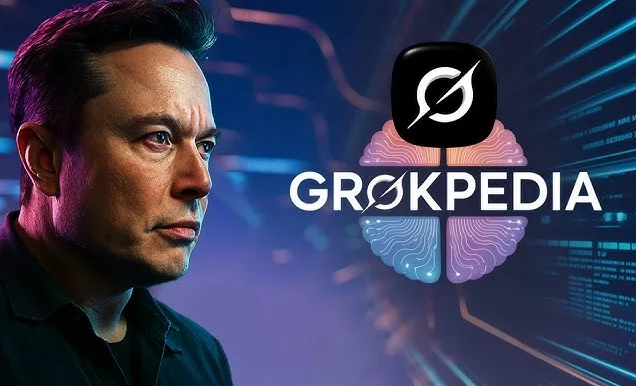With Grokpedia, Elon Musk escalates his offensive against the traditional informational order. No longer limited to Twitter, now X, or to Grok, his AI chatbot, or even to Starlink satellites—he now introduces an entire encyclopedia meant to rival Wikipedia. But beneath the guise of technological neutrality lies a chilling consolidation of informational power.
Since October 27, 2025, Grokpedia has been live. Positioned as an alternative to the so-called “left-leaning” Wikipedia, this platform aims to offer “objective knowledge,” allegedly free from progressive bias. Yet, Elon Musk’s stated goals thinly veil a deeper strategy: to capture, centralize, and reprogram the flow of information on a planetary scale according to his worldview.
The project’s launch, soon after Donald Trump’s return to the White House, and amidst orchestrated distrust of academic, media, and scientific institutions, is no coincidence. It unfolds within a fertile ideological ground for the rise of algorithmic knowledge, singular, closed, and devoid of checks.
An Emerging Information Hegemony
Grok, Musk’s AI engine, is now positioned as the architect of human knowledge. Where Wikipedia stood as a messy, open, human enterprise, Grokpedia claims the cold precision of computation and the “purity” of dehumanized truth.
Scratch that surface and the underlying bias is clear. Wired’s early access to the platform revealed a revisionist treatment of slavery, a conspicuous absence of a same-sex marriage entry, and articles promoting conservative narratives while undermining mainstream media. Elon Musk and Grokpedia do not herald a neutral future of knowledge, they signal the enforcement of a sanitized ideology disguised as technological progress.
From Access to Seizure of Knowledge
This is not just a contest of ideas. Musk is constructing an entire ecosystem, content generation (Grok), distribution (X), access (Starlink), and now structuring (Grokpedia), all vertically integrated and under his sole control. That’s the real danger: Elon Musk and Grokpedia aren’t competing with Wikipedia, they’re attempting to replace the entire epistemic infrastructure.
Wikipedia, flawed as it is, at least offers pluralism, debate, and the friction of human disagreement. Grokpedia erases that friction. It isn’t merely an encyclopedia, it is a political weapon, a machinery of influence, and potentially a forge for alternate history.
Pretended Neutrality, Real Domination
Musk’s advocates argue that his AI, unburdened by human passions, yields an unmatched objectivity. But AI, as philosopher Kate Crawford reminds us, is never neutral. It reflects the ambitions, blind spots, and biases of its creator. An AI trained primarily on data from X will reproduce the ideological leanings of that ecosystem: anti-woke rhetoric, libertarian dogma, and identitarian fixations.
Researcher Anaïs Nony describes this as “algorithmic capture”, a slow dispossession of knowledge by closed, opaque systems. Where intellectual rigor depends on peer critique and evolving interpretation, Grokpedia offers only singularity: a monolithic truth, produced by inaccessible code and imposed without appeal.
The Continuation of a Greater Project
Grokpedia is no aberration. It is the logical continuation of a long-term project begun with Starlink and amplified through X: to redraw the map of global power. This is no longer a rivalry with states, it’s a hostile takeover, using tech to strip governments of their traditional authority as arbiters of truth.
This is Musk’s true revolution: the total privatization of knowledge. In the name of accuracy, he strips away complexity. In the name of efficiency, he silences diversity. And under the pretense of freeing truth, he manufactures information, streamlined, directed, hegemonic.



